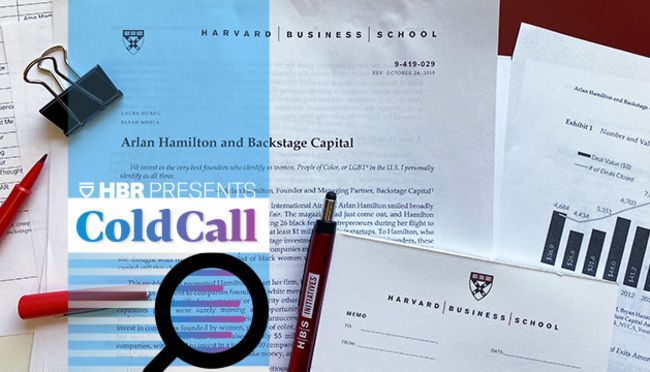Venture Capital →
→

- 13 Dec 2022
- Research & Ideas
The Color of Private Equity: Quantifying the Bias Black Investors Face
Prejudice persists in private equity, despite efforts to expand racial diversity in finance. Research by Josh Lerner sizes up the fundraising challenges and performance double standards that Black and Hispanic investors confront while trying to support other ventures—often minority-owned businesses.

- 03 Oct 2022
- Research & Ideas
Why a Failed Startup Might Be Good for Your Career After All
Go ahead and launch that venture. Even if it fails, the experience you gain will likely earn you a job that's more senior than those of your peers, says research by Paul Gompers.

- 25 Aug 2022
- Research & Ideas
It’s All in a Name: Reputable Investors Help Startups Shine
Attracting high-quality talent is a challenge for any young firm. Shai Bernstein says startups get a reputation boost and draw more job applicants when they're backed by well-known venture capital investors.

- 15 Feb 2022
- Cold Call Podcast
How to Make Venture Capital Accessible for Black Founders: An Entrepreneur’s Dilemma
In May of 2021, Kevin D. Johnson had just graduated from a rigorous Executive MBA program, and he needed to decide on his next career move. Johnson was the founder and CEO of a successful media company, but his career goals had shifted during business school. He wanted to use his talents to help other BIPOC entrepreneurs access capital and provide opportunities to create intergenerational wealth. Johnson evaluated his four options: work full-time at an online platform dedicated to connecting Black founders with funding, join a BIPOC-focused venture capital ("VC") firm, pursue a job at an established VC firm, or continue scaling his media company. Harvard Business School senior lecturer Jo Tango and Johnson discuss which option he should choose in the case, “Kevin D. Johnson: To Be a Venture Capitalist or an Operator.” Open for comment; 0 Comments.

- 27 Apr 2021
- Research & Ideas
IPO or M&A? How Venture Capital Shapes a Startup's Future
To a cash-strapped founder, any funding seems like a win, but research by Rory McDonald and colleagues shows that much more is at stake when it comes to venture capital. Open for comment; 0 Comments.

- 30 Nov 2020
- Research & Ideas
COVID Not Slowing VC Investment
Despite the economic uncertainty, most venture capitalists expect their investments to outperform major equity indexes and are still funding new endeavors, says Paul Gompers. Open for comment; 0 Comments.

- 17 Nov 2020
- Working Paper Summaries
Venture Capitalists and COVID-19
This survey of more than 1,000 venture capitalists finds that the VC industry and its portfolio companies have reduced their activity less than in previous recessions and have been more resilient than many other sectors of the global economy.

- 27 Oct 2020
- Working Paper Summaries
Does Venture Capital Attract Human Capital? Evidence from a Randomized Field Experiment
Using a randomized field experiment conducted on a large online search platform, this study illustrates how investments by top venture capital investors attract potential employees and improve the pool of candidates available for the startup.

- 13 Oct 2020
- Working Paper Summaries
Fencing Off Silicon Valley: Cross-Border Venture Capital and Technology Spillovers
This study of foreign corporate investment transactions from 32 countries between 1976 and 2015 finds these investments pose a trade-off: While they support young firms in pursuing innovations they could not otherwise afford, they also generate knowledge for the foreign investors.

- 27 Jul 2020
- Working Paper Summaries
The Evolution of CEO Compensation in Venture Capital-Backed Startups
Resolving uncertainty related to market demand—so called “product-market” fit—marks a key inflection point in the compensation contract for CEOs of venture-capital backed firms.

- 07 Jun 2020
- Working Paper Summaries
Financial Distancing: How Venture Capital Follows the Economy Down and Curtails Innovation
Common wisdom holds that VC investment and VC-backed startups are relatively insulated from downturns. This study shows that the relative quantity and quality of innovation declines more for VC-backed firms than for other types of firms during downturns.

- 04 Feb 2020
- Cold Call Podcast
Why Backstage Capital Invests in ‘Underestimated’ Entrepreneurs
Laura Huang discusses VC Arlan Hamilton’s strategy of backing entrepreneurs who have been ignored because of stereotypes, biases, and preconceptions. Open for comment; 0 Comments.

- 10 Apr 2019
- HBS Case
How Entrepreneurs Can Turn Lead Into Gold
Innovative about creating new products, entrepreneurs often lose imagination when it comes to funding their dreams. Andy Wu reveals alternatives beyond friends and family. Open for comment; 0 Comments.

- 04 Oct 2018
- Research & Ideas
Diversity Boosts Profits in Venture Capital Firms
VC firms that score high in diversity among their partners also tend to be more profitable, according to Paul Gompers. Open for comment; 0 Comments.

- 02 Apr 2018
- Research & Ideas
Is 'Gut Feel' a Good Reason to Invest in a Startup?
Most investments in startups should never be made, at least when using by-the-numbers reasoning. But funded they are. Laura Huang believes investors use gut instinct to manage that risk. Open for comment; 0 Comments.

- 12 Mar 2018
- Op-Ed
Op-Ed: Why BlackRock CEO Larry Fink Is Not a Socialist
BlackRock CEO Larry Fink’s open letter to CEOs has reignited the “shareholders versus stakeholders” debate. Bill George says it's actually not much of a debate: mission-driven, values-centered companies perform better. Open for comment; 0 Comments.

- 04 Aug 2017
- Working Paper Summaries
Private Equity and Financial Fragility During the Crisis
Examining the activity of almost 500 private equity-backed companies during the 2008 financial crisis, this study finds that during a time in which capital formation dropped dramatically, PE-backed companies invested more aggressively than peer companies did. Results do not support the hypothesis that private equity contributed to the fragility of the economy during the recent financial crisis.

- 11 May 2017
- Working Paper Summaries
Coordination Frictions in Venture Capital Syndicates
A startup typically has more than one investor, each with different incentives. Drawing on the authors’ experience, this paper documents frictions occurring when VCs with differing objectives work together in syndicates. Entrepreneurs must be careful about selecting and building the syndicate of VCs who back their firm.
- 10 May 2017
- Research & Ideas
Amazon Web Services Changed the Way VCs Fund Startups
Starting companies is becoming so quick and cheap that venture capitalists have shifted strategy funding entrepreneurs. Now, more startups get backing—but they have to prove themselves in a hurry, according to research by Ramana Nanda and colleagues. Open for comment; 0 Comments.

When Does Impact Investing Make the Biggest Impact?
More investors want to back businesses that contribute to social change, but are impact funds the only approach? Research by Shawn Cole, Leslie Jeng, Josh Lerner, Natalia Rigol, and Benjamin Roth challenges long-held assumptions about impact investing and reveals where such funds make the biggest difference.